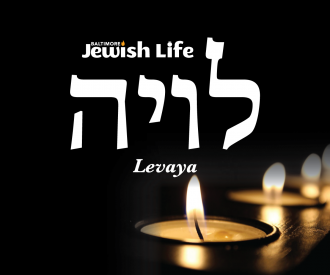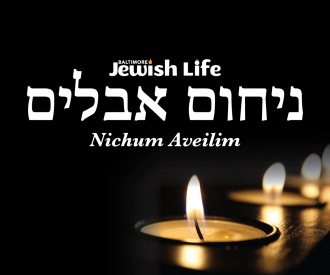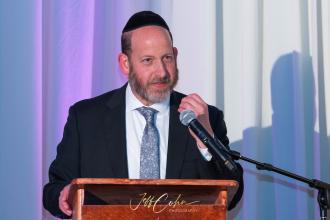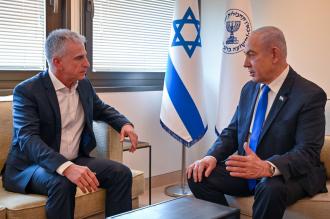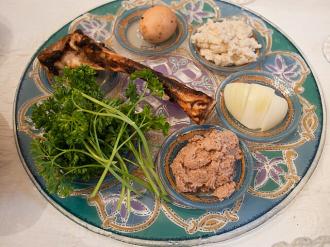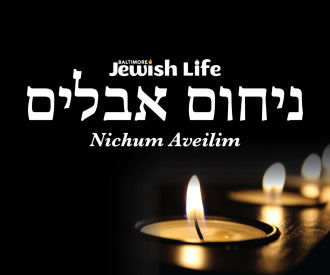As Yosef was about to succumb to the seductions of the wife of Potiphar, an image of his father appears to him pleading, “Yosef, your brothers will have their names inscribed upon the stones of the Ephod and yours amongst theirs; is it your wish to have your name expunged from amongst theirs and be called an associate of harlots?” (סוטה לו:)
Yosef restrains himself, attaining the appellation הצדיק, the ‘righteous one’, for all of eternity.
The Ephod, one of the garments worn by the Kohen Gadol, the High Priest, was an apron that had straps that rose up from behind him to cover his shoulders and had two gold settings, which contained two precious shoham stones. On these stones the names of all the twelve tribes were engraved.
There was another garment that connected to the Ephod, the Choshen, a breastplate worn upon the front of the Kohen Gadol that had twelve precious gems with the names of each of the tribes etched into their unique stone.
The question begs as to why didn’t Yaakov Avinu forewarn Yosef of the consequences of his name being purged from the Choshen as well?
It would seem that if Yosef would have failed in overcoming his passion during this ‘moment of truth’, he would have been reduced from the stature of being numbered among the illustrious Twelve Tribes that carried the legacy of the Avos, the Patriarchs.
So why then is there an implication that he would’ve been removed from the stones of the Ephod but not necessarily from the stones of the Choshen?
These shoham stones, with the names of the tribes engraved on them, the Torah states, are to serve as אבני זכרן לבני ישראל (שמות כח יב), remembrance stones for the Children of Israel.
In similar terms the Torah describes the stones on the Breastplate, with all the names of the tribes inscribed on them, as being borne by Aharon on his heart as he enters the Sanctuary, as a, זכרן לפני ד' תמיד (שם שם כט), constant remembrance before G-d.
Although both seem to serve as reminders to G-d, as it were, to think of us, with the Kohen Gadol representing our interests, yet by the Ephod it merely speaks of being remembered, whereas by the Choshen there is an emphasis on G-d being constantly conscious of our being.
Rashi in reference to the stones of the Ephod, quotes the Midrash that amplifies: So that the Holy One, blessed is He, will see the [progenitors of the] tribes written before Him, and He will remember their righteousness.
It would seem that these stones present before G-d how His children have acted dutifully and righteously, and are deserving of His special attention. One, however, who has come up short cannot make an appear on this slate of the righteous.
Perhaps the gems of the Choshen, in contrast, represent all of His children, righteous or not, who are always present before G-d, for His love for us is unconditional and תמיד, everlasting.
The Torah instructs that these two garments must always be connected together. ולא יזח החשן מעל האפוד (שם שם כח), and the Breastplate will not be loosened from upon the Ephod.
Aside for the efficient facilitation of the Avodah, service of the Kohen Gadol, by having the garments secured properly and not flapping about loosely there is a deeper message here.
The relationship we have with G-d goes two ways. We are devoted and faithful to Him and He is lovingly attentive to us. But which comes first? Do we earn His love through our deeds, or are we compelled to loyalty because He loves us so unqualifiedly?
Our relationship with G-d is undeniably the latter. G-d has promised he will never forsake us nor ever give up on us. Knowing that He loves us no matter how far we may have strayed gives us the impetus to always forge forward and never despair.
Yosef, in his utter loneliness, finds himself in a moment of despondence and is almost willing to succumb to easy and comforting temptation, he suddenly sees an ‘image’ of his father. He recalls the warm and loving relationship he had with his father, one whose unconditional love preceded Yosef’s reciprocal devotion. He realizes that what enabled him to have the courage to stand up to the taunts of his brothers, and even to risk his life in meeting up with them in fulfilling his father’s request to see how they are faring, stemmed from the confidence his father instilled within him through his abiding love and constant support.
Projecting from that connection to a father, who serves as the template for our relationship with G-d, he ponders how even more so G-d has endless patience, hope for our success and faith in us. It is with the knowledge of G-d’s confidence in us and unconditional love, as expressed in the stones of the Choshen, that no matter how far we have fallen we are lovingly implanted in His heart, that compels him to recommit to withstanding temptation and merit to return that loyalty and be forever etched in the stones of the Ephod in eternal righteousness.
We are taught that Esav’s descendants are sustained in the merit of his exemplary devotion and honor he bestowed to his loving father, Yitzchok. Despite this testament to the relationship he had with his father it never translated into fealty to his Father in Heaven. His loyalty to his own father was flawed because in Esav’s mind loyalty breeds love, you get back what you give. In that world view when one is weakened in the ability to provide, one lapses quickly into despair and frustration thinking if ‘I can’t invest there is no return’. That is why Esav couldn’t envision any benefit from a G-d he felt he was incapable of serving and therefore forsook Him.
Amalek, a grandson of Esav, represents the vilest magnification of the corrupt weed that sprouts from within Esav.
When the daughter of Haman the Amalekite, realizes that she emptied the contents of the toilet on the head her father Haman, showering him with excrement, after mistaking him for Mordechai, she panics in despondency and humiliation and reasons it is better to jump off the balcony and commit suicide than to face her angry father.
Only one who was raised with the misconstrued philosophy that parental love can only be earned, will opt to die rather than live with the wrath and disappointment of her abusive father.
The Great Rav of Dvinsk, Reb Meir Simcha points out that it at the hands of the descendants of Binyomin, Mordechai and Esther, that Amalek will be defeated. Binyomin, even more so than Yosef, displayed an exemplary relationship with his father. Yosef never revealed the truth about the brothers because he had committed to the cherem, the ban the brothers placed on anyone who would reveal the truth. Binyomin, however, had not participated in that oath, yet nevertheless refrained from causing his father any pain with that knowledge, even though he suffered immensely as a result of their misdeed. The love he sensed from his father bred an exceptional loyalty that he exhibited in return and enable him to overcome his own personal anguish and never despair. It was for that reason he became the ידיד ד', G-d’s beloved, and merit the Temple stand on his portion. He took the model of his connection to his father to create an exquisite bond with G-d.
•
At a recent kiddush celebrating the birth of a daughter, the father of the child, Josh Steininger, in explaining why they named their daughter Ahuva related a beautiful story and sentiment that touched my soul deeply.
In 2016, Sammi, his wife, had finished her intense master’s program and licensing exams, while Josh had left his job for an unofficial leave of absence. They decided to pack up and set out for four months in Israel with the goal of reconnecting with each other, themselves, and G-d. Less than a week later, on the eve of Rosh Hashanah, they found out they were expecting. A major conversation and focus of their time in Israel was emunah, faith and seeing the hand of Hashem in everything, taking note of divine providence, hashgacha pratis, in their daily lives, and internalizing the undeniable fact that Hashem was taking care of them.
After a wonderful four months they returned to the states, homeless, jobless, and pregnant! Within a relatively short time with the help of G-d and good friends they were able to settle into an apartment and decent jobs. All the while they were tracking the remarkable hashgacha, providence, in their lives and deepening their emunah, faith. They had decided that if the baby were going to be a girl, they would name her Emunah. They joked that Sammi’s ‘Emunah’ was literally growing inside of her.
On erev Rosh Chodesh Sivan, after an intense labor and delivery they heard the words: “It’s a girl!”
In the recovery room Sammi informed Josh that the baby’s name would be Ahuva. Bewildered, Josh remembered saying, “really Sammi, are you sure? I thought we had decided on Emunah?”
And she said, yes, it’s Ahuva.
Sammi went on to explain that the baby’s name is Ahuva, meaning ‘to be loved’, because while yes it is a beautiful and vital thing to constantly work on our faith and commitment, but ultimately it had nothing to do with their emunah in Hashem and everything to do with G-d’s boundless ahava, for them. They wanted to emphasize the haspahah, or flow, from Hashem down towards them. He had constantly showered them with so much love throughout their remarkable journey - the name Ahuva, they felt, was indeed the right choice.
•
When we will sense and perceive G-d’s unconditional love towards us we will no doubt respond loyally and joyously, coping with whatever challenges we may face, and never despair.
That is how we will finally eradicate the negative attitudes of Amalek and restoring G-d to His and our home in Yerushalayim.
באהבה,
א פרייליכען פורים,
צבי יהודה טייכמאן

